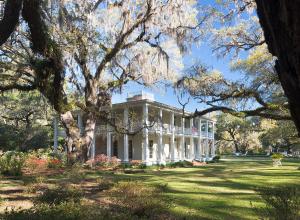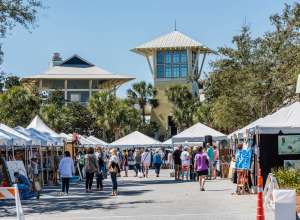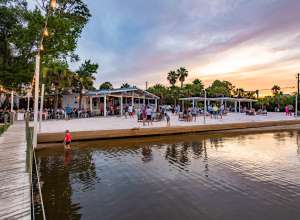Story
Coastal Dune Lakes Episode 6 - Education on the Coastal Dune Lakes
August 14, 2014 by Nic Stoltzfus

This past week my dad showed his latest film, The Florida Wildlife Corridor Expedition: Everglades to Okefenokee, at the Martin Theatre in Historic Panama City.
After the film ended, I was helping out with merch sales and a lady asked about my occupation. “Are you in school?” I replied that I had already graduated from college. “Are you in graduate school?” I said that I worked for my dad. “Oh, so you are home-graduate-schooled!” We both laughed, but I had a sharp moment of recognition: that is exactly how I would sum up my experience of working for my dad over this past year.
 The Florida Wildlife Corridor Film on the Martin Theatre marquee.
The Florida Wildlife Corridor Film on the Martin Theatre marquee.
I’ve not been to graduate school, but my sister obtained her degree earlier this year and, from what I saw, it took a lot of work. And she was constantly reading—reading all she could get her hands on about her research topic. And that is what I have been doing for more than a year: my research topic is the coastal dune lakes of Walton County.
My thesis advisor is Elam Stoltzfus. I need to submit my research (for the script) by next month. That’s one way of looking at it. Dad’s metaphor for my job is that I need to be a sponge and soak up all the info I can about them (“They call be Bob, Spongebob.”).
It has been one long year of learning and education. Part of our assignment with creating an hour-long documentary about the coastal dune lakes, and a companion coffee-table book, is to adequately document the lakes. And how do you do that? It was on the coastal dune lakes that I got my first taste of professional photography.
Sure, as the son of a professional videographer, I got basic lessons on pictures but, prior to working with Dad, I used my phone or a point and click digicam. When I started working with him he taught me how to take better pictures, and I also picked up a few tutorials on how to become a better photographer, as well.
I knew I had to learn how to take good pictures (and edit good pictures!) if I was going to work with him. And I have. By taking pictures of nature I learned to slow down and take a closer look at everything. I started looking at the natural world in a different way. It’s not just one large slap of green paint, not at all. Underneath the trees and underneath the sand there is a thriving city with inhabitants unseen to my human eyes.
Ants and beetles and worms and crickets moving beneath my feet. Dragonflies and butterflies above my head. Birds soaring overhead, snakes slithering beneath me. These natural areas are FULL of life—it just required me learning how to stop. And listen. And watch from the right perspective, the proper perspective.
I have always loved the outdoors; I grew up halfway in the classroom and halfway out of the classroom by tagging along with Dad on film shoots all over the state. But, by working on this project, I really learned how to love and appreciate nature. Another part of my education of the coastal dune lakes was through interviewing people for the documentary. As we began interviewing people about the coastal dune lakes, my mind has expanded even further.
We have interviewed geologists, artists, local residents, environmentalists, activists, community planners—the list goes on and on. And each one has a different perspective on the dune lakes, each one views them with a different lens. The artist sees them as works of art, the geologist as layers of sand piled over time, the activist as land to be protected, the local as places of recreation and fun.
Every person we interviewed took us to their position and showed us what the lakes look like from their standpoint. Therefore, whenever I think about the coastal dune lakes, I think about education. There are thousands of ways that people can educate themselves about the lakes. The Choctawhatchee Basin Alliance has a great webpage with links to research and videos about the lakes.
They even offer tours from time to time. We documented one coastal dune lake tour that took a look at three coastal dune lakes and their ecosystems. Dr. Sarah Schindele and Brittany Tate of Choctawhatchee Basin Alliance managed the tour. We began that morning with Jeff Talbert of Topsail Hill Preserve State Park leading the tour to a wet prairie teeming with rare carnivorous plants and showcasing Lake Campbell, one of the most pristine coastal dune lakes in Walton County.
Later we drove east to Grayton Beach State Park where Patrick Hartsfield led a group through the dune ecosystem that separates Western Lake from the Gulf of Mexico. After lunch the group took a tour of Oyster Lake.
 Dr. Sarah Schindele (front) with members from the coastal dune lakes tour
Dr. Sarah Schindele (front) with members from the coastal dune lakes tour
Walton Outdoors has put together a great site with all the public access points along the lakes. You can attend Coastal Dune Lake Advisory Board meetings and find out what the recent news is along the lakes. We’ve even done a video on the advisory board, as well!
The Choctawhatchee Basin Alliance is working on an updated Dunes in Schools program targeted towards middle school students in south Walton. This is an opportunity for children to learn about the coastal dune lakes and how they work in the classroom, grow sea oats, and then plant them along the dunes at Topsail Hill Preserve State Park.
Opportunities abound for educating yourself about coastal dune lakes. When I spent a year studying abroad in London with the FSU Communication Program, my professor encouraged us to use the city as our classroom. Over the last year, the coastal dune lake country of south Walton has been my classroom.
From the lakes I learned the importance of stillness and that the most spectacular part of the sunset is sometimes after the sun has dipped down past the horizon; the multicolored clouds illuminating sky and water alike. The people in and around the area have been my professors. From them I’ve learned plant names, area history, and how to ward off yellow flies.
The grey heron on Western Lake, the alligators at No-Name Lake, the snowy plover chicks and the loggerhead sea turtles by the dunes at Topsail have all been my teachers. The animals in the area taught me to be respectful and ever mindful that they are wild creatures and deserve more space than my pets. I have learned a little bit of something from all the life that exists down there, and I am a very fortunate student. I can’t wait for my second year—when do I sign up for fall classes?
***
Here is our latest video about the coastal dune lakes and education. I wrote the script, Dad did the cinematography, and our editor, Joey Dickinson, put all the pieces together. Enjoy.
















